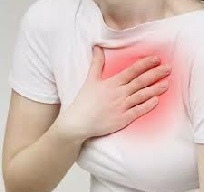Acid Reflux and chest pain
One of the most common symptom of acid reflux, GERD disease is chest pain . The onset of reflux pain occurs in a number of different forms. You may find the pain burning or fiery, stabbing. Sometimes this is dependent on the type of acid reflux or the severity of the condition . However, such feeling is similar to heart attack and this is very often confused with the first symptoms of a heart attack, especially if you have never felt the pain before. This can be very dangerous since heart attack is a much more serious problem. Therefore, it is very important for you to know whether acid reflux or a more serious heart condition such as heart attack is causing your chest pain.
attack and this is very often confused with the first symptoms of a heart attack, especially if you have never felt the pain before. This can be very dangerous since heart attack is a much more serious problem. Therefore, it is very important for you to know whether acid reflux or a more serious heart condition such as heart attack is causing your chest pain.
The acid reflux chest pain is actually caused by the acid that has somehow managed to escape from the stomach. This happens by many things but one of the most common reasons is the weakening or relaxing of the Lower Esophagus Sphincter ( LES ). This ring of muscle functions as a valve, which keeps food and acids from washing back out of the stomach and opens only as you swallow . Once this circle of the muscle has been weakened, by poor diet, excessive smoking and drinking and other factors like Hiatal Hernia, the acid can easily escape and finds its way out of the stomach and into the esophagus, which is the tube that runs from the stomach to the throat and mouth.
Once the acid reached the esophagus lining, the onset of severe chest pain is likely to begin.
The most common medication people follow in case of acid reflux pain is to have an antacid. This may give immediate relief from the uneasiness and discomfort caused by acid reflux pain but antacid is not a cure of the disease. It is just a relief from the symptom of acid reflux problem.
Despite of the similarities between heartburn and heart attack, there are nevertheless, some differences.
To differentiate between acid reflux pain and a heart attack, you must be conscious of the kind of pain that your are getting. Normally acid reflux pain increases on lying down or after a large meal. On the other hand a heart attack usually accompanies a feeling of heaviness, shortness of breath, sweating, dizziness, weakness and fainting, with the pain radiating to the left arm and neck area as well . These signs and symptoms may indicate a heart attack, you must get emergency help immediately, particularly those who have family history of heart disorder must be cautious and take these signs very seriously.
be conscious of the kind of pain that your are getting. Normally acid reflux pain increases on lying down or after a large meal. On the other hand a heart attack usually accompanies a feeling of heaviness, shortness of breath, sweating, dizziness, weakness and fainting, with the pain radiating to the left arm and neck area as well . These signs and symptoms may indicate a heart attack, you must get emergency help immediately, particularly those who have family history of heart disorder must be cautious and take these signs very seriously.
Usually the chest pain caused by acid reflux disease can be relieved by taking an antacid or H2 blocker drug, whereas in case of heart problem, antacids do not help and pain will persist.
In any case, if you are unsure whether you are suffering from acid reflux or heart disease, it is advisable to seek medical help.
Once the cause of chest pain is properly diagnosed and proven to be due to acid reflux, the treatment is simple. Discomfort can be brought to relief almost instantly by taking over-the-counter medicines or prescribed medication. On the other hand, some people prefer to use alternative medicines, such as herbal treatment because many people believe that such medicines are very helpful. However apart from the above medication, more larger lifestyle changes and some dietary should be also considered to prevent recurrence of the GERD symptoms .
These changes could include looking at the patient ‘s current diet and exercise and then changing them for the better as well as other things such as having more frequent meals instead of the normal three times a day eating habit and cutting down or stopping drinking alcohol and smoking.
In general occasional heartburn or acid reflux pain is easy to bring to relief and nothing to worry about. However, if pain becomes frequent or severe, you should seek the attention of a health care professional for further treatment.
Back to Top





